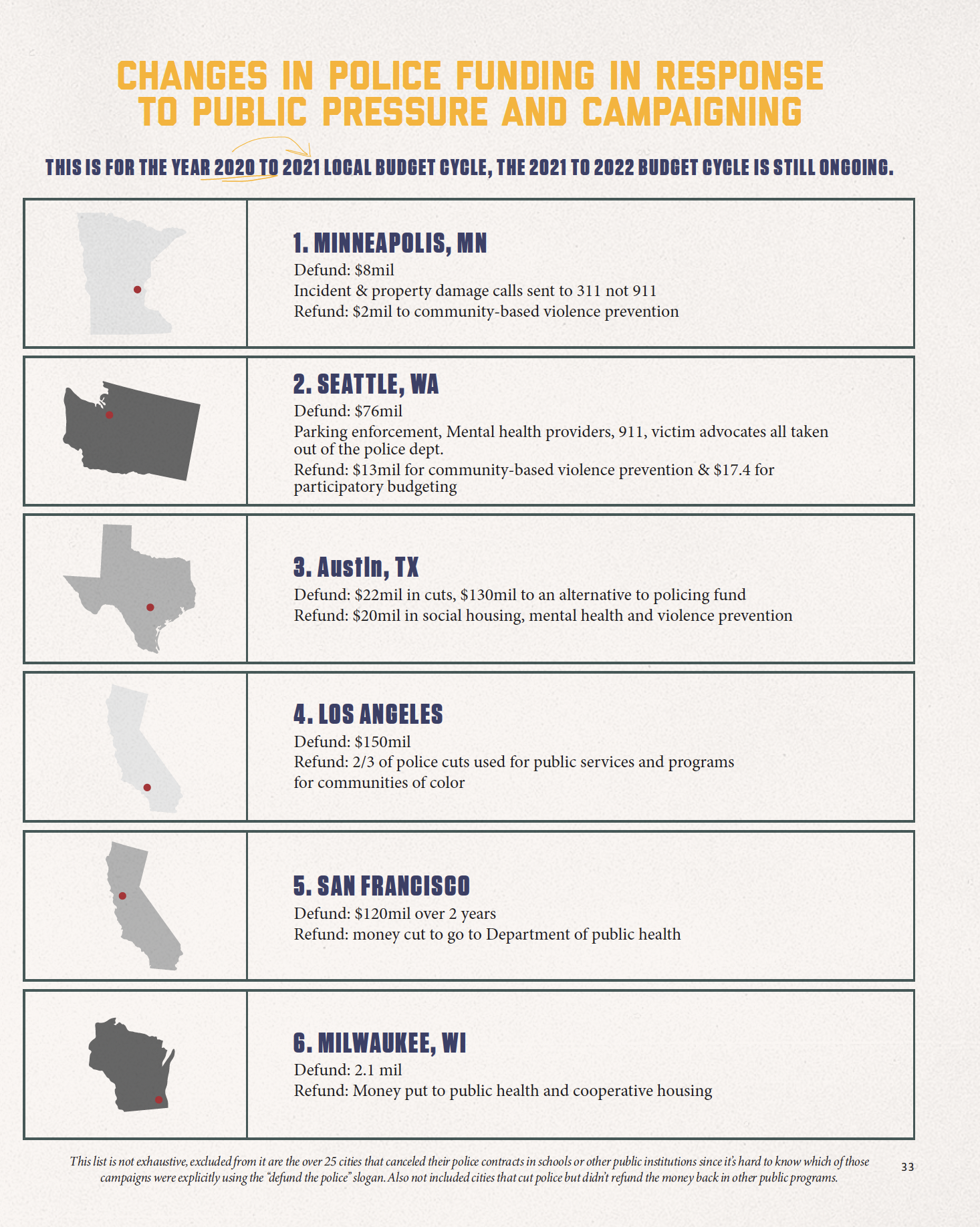Where The Money Go?
written by Jasson Perez
an article from WARTIME ISSUE No. 4
“Defund the Police” is less than two years old.
There are a lot of opinions about the “Defund the Police” movement, but as an abolitionist and someone who loves data, it is one of the most successful campaigns in terms of concrete wins that I have seen in awhile – especially for a campaign that grew from a moment of spontaneous mobilizing. Most of the time such spontaneous moments struggle to transition to structure-based forms of organizing campaigns, let alone, make it to the finish line to get wins from a discrete, boring & undemocratic process that city budget fights are.
Still, there seems to be a lot of hand wringing from people on the left saying that it is ineffective because of the demand itself.
So I thought I would list some of the wins to give people an idea of its current success.
There are multiple ways to measure effectiveness, one way is to measure campaign wins.
Here I’m qualifying wins as explicit use of “Defund the Police” as a framework, cuts to police budgets, and investments in public safety alternatives or non-carceral public goods and services.
This is for the year 2020 to 2021 local budget cycle. The 2021 to 2022 budget cycle is still ongoing.

This list is not exhaustive, excluded from it are the over 25 cities that canceled their police contracts in schools or other public institutions since it’s hard to know which of those campaigns were explicitly using the “defund the police” slogan. Also not included cities that cut police but didn’t refund the money back in other public programs.
That is a lot of success for such a “terrible demand.”
Some may want to say it’s due to the protest upsurge.That may be true to a point but we didn’t see this level of police cuts and reinvestments when other BLM protest upsurges occured. Some may say that due to the recession, police budgets were going to get cut regardless. Well, that’s why I didn’t include cities where there was no reinvestment of the funds.
Lastly, this doesn’t include polling, agenda setting, or culture shifts and changes in public opinion. These are areas where arguments can be made that the “Defund the Police” movement has shifted the terrain away from liberal reforms and away from blue lives matter politics. Still, those aspects are hard to measure and quantify. Hence, why I didn’t include it.
To be clear, there has been a counter-reaction by the right and liberals to try to claw back aspects of recent defund wins. But this happens when any left progressive or radical demand becomes policy. We see this with the anti-Critical Race Theory legislation being pushed by the right all across the country right now. This is a response to efforts to make public education culturally and historically accurate. We see this around issues of class with efforts to roll back union rights and freeze minimum wage increases. We see this with the constant effort to roll back voting rights. Yet we don’t see leftists, progressives, and most liberals saying we should abandon the fight for a living age, right to a union, voting rights or democratically controlled, fully-funded education with a culturally relevant and historically accurate curriculum. Yet, with “Defund the Police”, people question its viability, despite its wins in the face of fierce opposition.
The attacks on “Defund the police” would be misplaced even without these successes but it’s even more suspicious in the face of such success. If tax the rich, the Green New Deal, or another “popular” local left demand had the same success in its first two years of existence, we would be trying to replicate it everywhere. Yet for defund, the opposite has happened despite this level of success.
This aversion is connected to a Left that is hesitant to fight carceral power coupled with a patronizing need to always tell Black-led Left movements what they need to do. We see a similar energy towards the “Abolish ICE” movement.
It’s easier for the Left to imagine the end of capitalism than the end of policing.
Or put another way, the left thinks it’s easier and more effective to organize a political constituency to end capitalism than to organize a political constituency to end policing.
But part of the abolitionist argument to the anti-capitalist left has been that the strength of any potential constituency to end capitalism is tied to the balance of forces as they relate to carceral power and also said constituencies commitment to ending carceral power.
Why? Because carceral power (much like imperial power) and the politics that derive from it are incubators of right wing, reactionary politics that specifically undermine left wing egalitarian possibilities.
And so I think it’s this dynamic that animates so much Left (in the multi-racial sense, because plenty of BIPOC Left folx be like this too) aversion to defund. Of course, aversion and even critique is fine for any Left project, but its the nature of the critique that is troubling and limiting.
